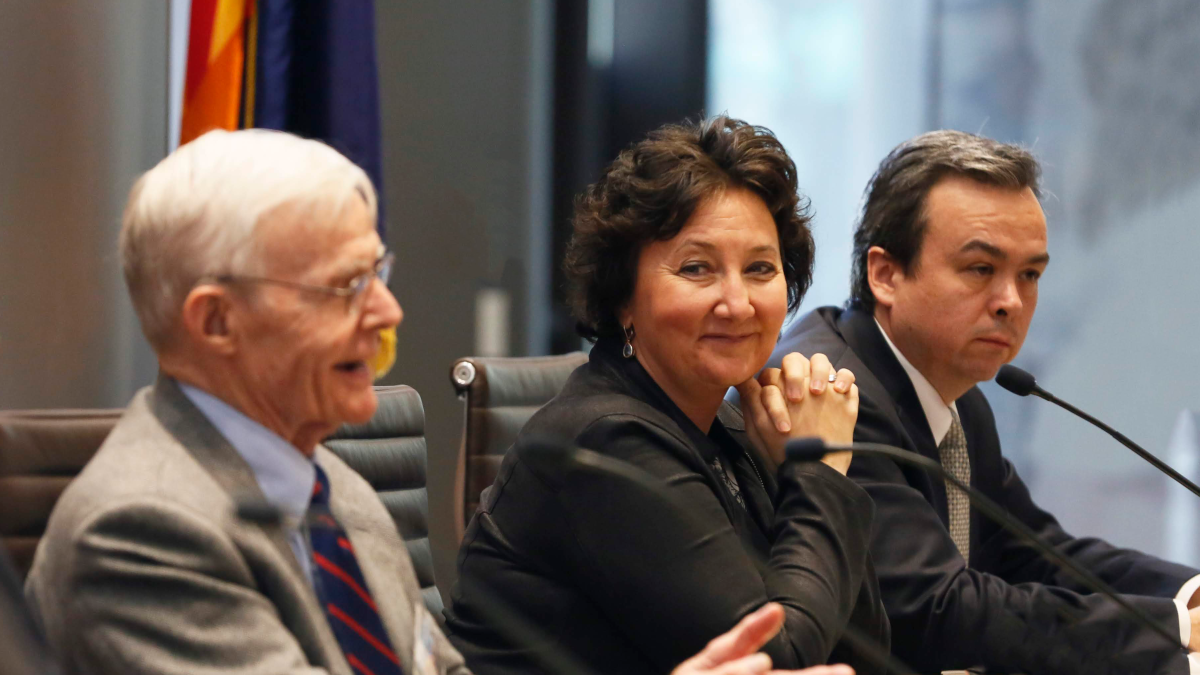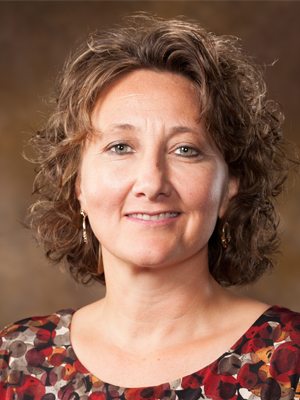First Native American female dean and prominent Indian law trailblazer to teach at ASU Law

Stacy Leeds, Salt River Pima-Maricopa Indian Community distinguished visiting Indian law professor with Judge William Canby Jr. (at left) and Larry Roberts, professor of practice at ASU Law at the NALSA Moot Court Finals.
The Sandra Day O’Connor College of Law at Arizona State University is honored to welcome Stacy L. Leeds as the Salt River Pima-Maricopa Indian Community Distinguished Visiting Indian Law Professor. Leeds is a citizen of the Cherokee Nation and carved her place in history when she was named the dean of the University of Arkansas School of Law in 2011, becoming the first Native American woman to be appointed to such position. Currently, she is the vice chancellor for economic development, dean emeritus and a professor at the University of Arkansas, and she will teach federal Indian law this fall as part of ASU Law’s Indian Legal Program.
“We are very honored to have Vice Chancellor Stacy Leeds as the Salt River Pima-Maricopa Indian Community Distinguished Visiting Indian Law Professor,” said Patty Ferguson-Bohnee, professor and faculty director for ASU Law’s Indian Legal Program and director of the Indian Legal Clinic. “We believe she will be a great addition to our team this fall and a wonderful resource for our students. From the Indian Child Welfare Act to opioid litigation to tribal agriculture, she has combined scholarship and practice to advance and defend Indian rights.”
Leeds has a passion and dedication to Indian law, and a determination to help inform Indian law policy and the next generation of lawyers.
However, she did not always know this would be her path. As a child she grew up in Muskogee, Oklahoma, and went on to become an all-state basketball player for Muskogee High School. She then enrolled at Washington University, where she earned a bachelor’s degree while also participating as a student athlete playing basketball and tennis.
“I knew I wanted to go to law school when a lightbulb moment occurred during my junior year of my undergraduate studies,” Leeds said. “I took a grad school course in social work where the final project involved mock testimony before Congress on Indian child welfare issues. I was hooked by the process, the research and the oral advocacy.”
She obtained two law degrees — a Master of Laws degree from the University of Wisconsin and a Juris Doctorate from the University of Tulsa — and later obtained an MBA while a professor at the University of Kansas.
Currently, she divides her time between downtown Fayetteville near the University of Arkansas campus and Tahlequah, Oklahoma, the capital of the Cherokee Nation. With her visiting professorship at ASU Law, she will travel to its Downtown Phoenix campus throughout the fall semester.
“ASU Law is at the top of the Indian law field, and it’s an honor to be a part of the program. It is also very meaningful that the Salt River Pima-Maricopa Indian Community continues to invest in law students by providing new opportunities and access to new mentors,” Leeds said.
ASU Law’s Indian Legal Program was established in 1988 and, through its connections to each of Arizona’s federally recognized 22 tribes, is home to one of the highest concentrations of Native American students and Indian law students in the nation. Leeds joins a team of other nationally recognized faculty who are leading scholars in their fields.

Stacy L. Leeds, Salt River Pima-Maricopa Indian Community Distinguished Visiting Indian Law Professor at ASU Law.
Leeds has been connected to ASU Law for many years. Several of the students she has taught in prelaw programs or otherwise mentored have started their careers at ASU Law. Leeds also delivered the keynote at ASU Law’s William C. Canby Jr. Lecture Series in 2013, and she served as a championship-round judge at the National Native American Law Student Association (NNALSA) Moot Court Competition when ASU Law hosted the annual event in 2018.
“I look forward to getting to know the students and actively participating in their professional development,” Leeds said. “I know that I will also enjoy the full scale of the Indian Law program, which will include interaction with tribes and the Indian law bar in the region.”
Leeds has also made a significant impact in the Native legal community. Previously, she has served as a justice for the Cherokee Nation’s Supreme Court as the first woman and youngest person to be appointed. Leeds also served as a judge for six other Native nations, as a member of the Board of Directors of the National American Indian Court Judges Association, and as chair of the American Bar Association Judicial Division’s Tribal Courts Council.
“I have had the greatest professional privilege anyone could ever hope for: repeatedly being in jobs where I felt like I was in exactly the right place at the right time. When that type of alignment occurs, that’s the point of maximum impact,” Leeds said. “I have been fortunate to experience that many times, not limited to, but certainly including my time as a law school dean and as justice on the Cherokee Nation Supreme Court.”
When further reflecting on her time as the first female Native American law dean, she is proud and encouraged to see additional women ascending to higher roles in academia.
“It was truly an honor with big responsibility, and I am so thrilled that 'only' Native woman has now been amended to 'first' Native woman with the recent appointment of my colleague Dean Elizabeth Kronk at the University of Utah. There will be many to follow and I will celebrate them all. I am keenly aware that my opportunities have been possible because other people opened doors for me and took chances on me,” Leeds said.
Opportunities are exactly what she hopes future law students take advantage of during their time in law school. Her advice is simple: keep an open mind and seize every opportunity as to where your career may take you.
“Studying law will give you immeasurable skills that can translate across so many endeavors. If you embrace that, you will never be bored,” Leeds said.
To fellow Native women studying law, she notes that most Native law students are majority women and increasingly so.
“It will take a few more years for that trend to fundamentally change the landscape of Indian country, but soon most of the Native lawyers will be women in the legal profession and by consequence, many more women will be tribal leaders,” Leeds said. “My advice for Native women is this: Get ready— it’s going to be a wild ride. You can’t always control the timing of your opportunities, but you can control how well-prepared you’ll be.”
More Law, journalism and politics

TechTainment conference explores the crossroads of law, technology, entertainment
What protections do writers, actors, producers and others have from AI? Will changing laws around name, image and likeness (…

How to watch an election
Every election night, adrenaline pumps through newsrooms across the country as journalists take the pulse of democracy. We…
Law experts, students gather to celebrate ASU Indian Legal Program
Although she's achieved much in Washington, D.C., Mikaela Bledsoe Downes’ education is bringing her closer to her intended…